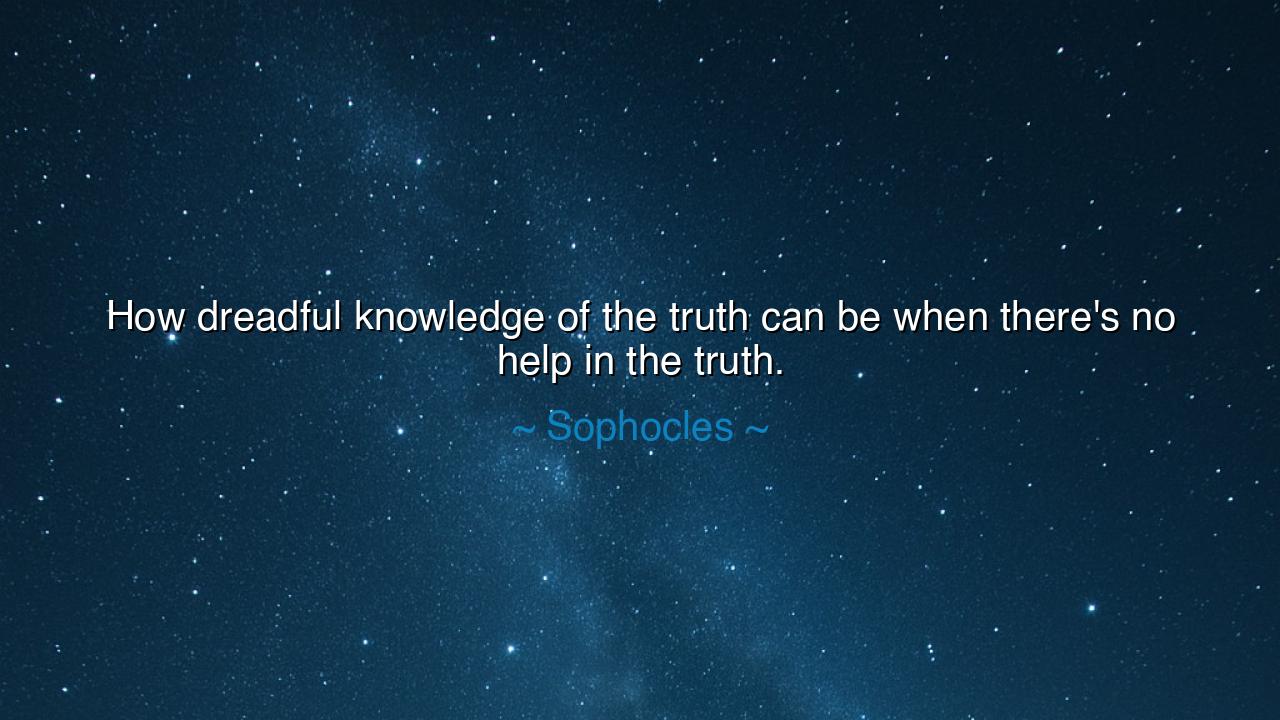
How dreadful knowledge of the truth can be when there's no help






“How dreadful knowledge of the truth can be when there’s no help in the truth.” — Sophocles
In this somber and eternal utterance, Sophocles, the great tragedian of ancient Greece, speaks to one of the most profound agonies of the human spirit — the pain of seeing truth clearly when one is powerless to change it. These words, drawn from his immortal play Oedipus Rex, flow from the mouth of the blind seer Tiresias, who knows the terrible secret that Oedipus himself is both the savior and the ruin of his city. Here, knowledge, usually a source of light, becomes a burden too heavy to bear; for when truth offers no redemption, when it brings only sorrow, it becomes dreadful indeed. Sophocles reveals the dual nature of knowledge — that it can liberate or destroy, depending not on its content, but on what power we have to act upon it.
The origin of this insight lies deep within the tragic wisdom of the ancient Greeks. To them, fate and truth were intertwined threads in the tapestry of existence. They believed that to know one’s fate was not necessarily a gift, but often a curse — for in knowing, one might still be unable to escape what the gods had decreed. The myth of Oedipus, in which a man’s search for truth leads him to discover his own guilt, embodies this eternal dilemma. Sophocles, through Tiresias, speaks to all generations: there are moments when to see clearly is to suffer, when knowledge, stripped of hope, offers no comfort and no deliverance.
In this way, Sophocles reminds us that truth is not always merciful. It is like fire — it illuminates, but it burns as well. To know the truth of one’s own failures, the certainty of a doomed love, or the inevitability of loss — these are revelations that cut deeper than ignorance ever could. There are times when ignorance, though fragile, shields the heart from despair. This is not to say that ignorance is virtue, but that truth without help, knowledge without remedy, can pierce the soul like a sword. Even the wisest, when confronted with truths beyond human power, tremble beneath their weight.
Consider the story of Alan Turing, the brilliant mathematician who helped break the Nazi Enigma code during World War II. His knowledge saved millions, yet he lived in an age when his truth — his identity — condemned him. After the war, he was persecuted for his homosexuality, and though he possessed knowledge that had turned the tide of history, that truth could not save him from the cruelty of his time. For him, knowledge of the truth brought no help, only isolation and suffering. His life stands as a modern echo of Sophocles’ warning: that when society, fate, or circumstance denies mercy, even truth becomes a torment.
The power of this quote lies in its timeless relevance. In every age, humanity seeks truth — scientific, moral, personal — yet often finds that not all truths bring comfort. To know the reality of human suffering, to grasp the depths of injustice, to see the shadow side of progress — these are forms of knowledge that demand courage. Wisdom therefore lies not only in knowing truth, but in learning how to carry it, and in seeking where it can do good. For even dreadful truths, when used rightly, can become the foundation of compassion, reform, or redemption. The tragedy is not in knowing, but in knowing and being unable to heal.
Sophocles, through this ancient lament, teaches us the moral burden of awareness. To awaken is to see both beauty and pain, light and darkness. But he also reminds us that knowledge without purpose, or without the strength to act, is anguish. Thus, we must pair our search for truth with the will to bring help, to turn knowledge into action. Otherwise, like Tiresias, we become prophets of sorrow — bearers of truths that wound but cannot mend.
Therefore, my dear listener, take this lesson to heart: seek truth, but seek also the strength to bear it and the wisdom to use it. Do not flee from what is real, for ignorance is but a fleeting shadow, yet do not pursue knowledge recklessly, without compassion. Let your search for truth be married to mercy; let your learning serve the healing of others. For when truth brings no help, it is tragedy; but when truth is joined with love, it becomes salvation.
And so, remember the voice of Sophocles through the ages: “How dreadful knowledge of the truth can be when there’s no help in the truth.” These words are not a call to despair, but to responsibility. For truth, when faced bravely and used wisely, ceases to be dreadful — it becomes sacred. Seek to be the one who transforms truth into healing, who brings help where there is pain, and who turns the burden of knowledge into the blessing of wisdom.






AAdministratorAdministrator
Welcome, honored guests. Please leave a comment, we will respond soon